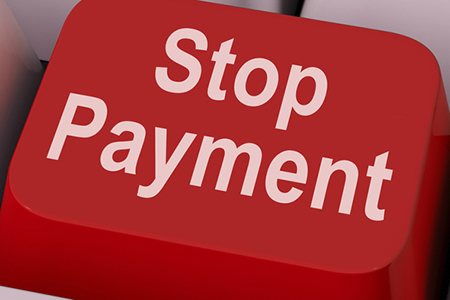(TNS)—Do you have a checking account? What should you do if you sent a check to someone and it hasn’t arrived weeks later? If you’re worried that it may have been lost or stolen, it’s critical you cancel it, or stop payment, as soon as possible.
Here are the steps to cancel a check—and what it may cost you.
Personal Checks vs. Cashier’s Checks
Your personal check contains your name, your account number, a bank routing number, a check number, the payee’s name and the amount payable. When the payee’s bank receives the check, your signature authorizes the bank to transfer funds from your account to the recipient’s account. Usually it takes a couple of business days for a check to clear once it’s been deposited. If a check hasn’t cleared, you can stop payment on it.
A cashier’s check, on the other hand, is drawn directly on the bank that issued the check and not on your account. You may need to use a cashier’s check when you are making a large payment, such as a security deposit on an apartment. You pay the bank the sum needed and a small service fee of $10 or so, and the bank guarantees the funds to the payee. In most cases, banks must honor a cashier’s check when it is presented, and a stop payment is not available.
How to Cancel a Check
If you made an error when writing a personal check—such as making it out for the wrong amount—or if you think the check may have gotten lost in the mail, the first thing you should do is review your account’s transaction history online or call the bank’s 800 number to find out if the check has already cleared.
If the check has not been posted, contact your bank to stop payment. You’ll need a few pieces of information to do this:
- Your account number
- The exact amount of the check and who it was made payable to
- The check number
If you are enrolled in online banking, you can stop payment on a check from your mobile device or computer. Otherwise, you’ll need to call the bank or visit your branch office.
If you make your stop-payment request in time and in writing, your bank won’t be able to cash the check for six months. After that, your stop payment request expires and the check could be paid. Many banks, however, don’t honor checks after six months have passed (but be sure to ask your bank). If you make a stop payment request by phone and do not follow up in writing, the bank can cash the check after 14 days. That’s why it is important to renew your request in writing.
If your check has already been cashed and you suspect fraud, contact you bank so it can initiate an investigation. By law you are generally not responsible for a check if someone forged the signature of the person to whom you made out the check.
Cost of Canceling a Check
Depending on your bank and the type of account you have, you may have to pay a fee of between $15 and $30 to stop payment on a check. If you have an interest-bearing checking account with a fairly high monthly minimum balance, the fee may be waived altogether. Contact your bank to find out exactly what you can expect.
Visit Bankrate online at www.bankrate.com.
©2018 Bankrate.com
Distributed by Tribune Content Agency, LLC
For the latest real estate news and trends, bookmark RISMedia.com.











